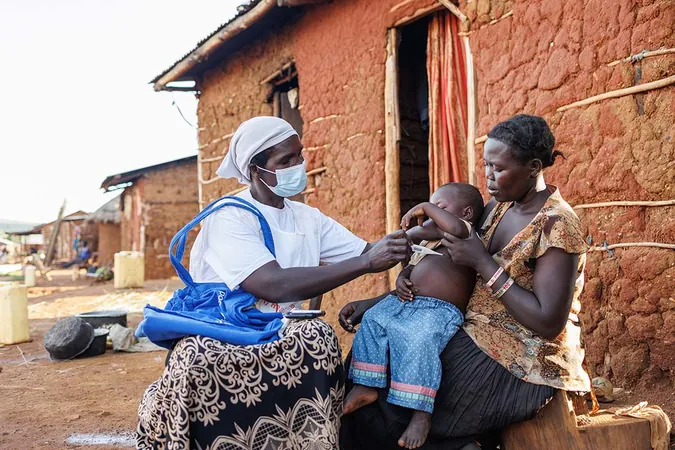
Uganda Launches Largest Malaria Vaccine Campaign in History: A Game Changer for Public Health!
2025-04-02
Author: Arjun
Introduction
In a groundbreaking initiative, Uganda’s Ministry of Health has officially launched the largest malaria vaccination campaign to date, backed by global health partners like Gavi, UNICEF, WHO, PATH, and CHAI. This monumental event took place on April 2, 2025, in Apac District, a site notorious for staggering malaria transmission rates. With this launch, Uganda becomes the 19th African nation to incorporate the malaria vaccine into its routine immunization schedule, setting an ambitious example for the continent.
The Malaria Vaccine and Its Goals
The R21/Matrix-M malaria vaccine, which requires four doses administered at specific intervals of 6, 7, 8, and 18 months, aims to protect 1.1 million children under the age of two across 105 high- and moderate-malaria transmission districts in Uganda. This campaign is expected to expand nationwide in the near future, providing hope for the nation’s youngest and most vulnerable citizens.
High Malaria Burden in Apac District
Notably, Apac District sees the highest number of mosquito bites per person globally, exceeding 1,500 annually. Malaria has been a deadly foe in Uganda, accounting for up to 40% of outpatient visits and 25% of hospital admissions among children. In 2023, Uganda ranked among the five African countries with the highest malaria burden, alongside Nigeria, DRC, Ethiopia, and Mozambique, underscoring the urgent need for prevention strategies.
Statements from Health Officials
Health Minister Dr. Jane Ruth Aceng Ocero hailed the vaccine's introduction as a significant milestone. "We anticipate that this vaccine will prevent at least 800 cases of severe malaria among children each day, alleviating the financial strain on families who spend an estimated UGX 15,000 per case for treatment," she stated. Parents are encouraged to ensure their children complete all four doses for optimal protection.
Role of Gavi and Funding Challenges
Gavi plays a crucial role in coordinating this global vaccination effort, providing vital financial support for vaccine procurement and distribution. So far, Gavi has helped integrate the malaria vaccine into routine immunization programs across 19 African nations. This collaborative approach aims to enhance the effectiveness of malaria control strategies worldwide.
Sustainability Concerns
However, the sustainability of these programs depends heavily on Gavi's ability to secure funding for its upcoming five-year strategic plan starting in 2026. A shortfall in financial resources could jeopardize these life-saving initiatives, potentially increasing preventable deaths and endangering global health security.
Global Support and Urgency
Dr. Sania Nishtar, CEO of Gavi, emphasized the magnitude of Uganda's battle against malaria. "This vaccine is a vital tool that can save lives and prevent hospitalizations. But to continue this fight effectively, we need the support to sustain and expand these efforts, ensuring more children receive the protection they desperately need."
Collaborative Efforts with UNICEF
In conjunction with Gavi, UNICEF is actively involved in promoting the vaccine rollout. Dr. Robin Nandy, UNICEF Representative to Uganda, affirmed, "This campaign represents a significant turning point in our mission to safeguard children’s health." He urged parents to embrace this opportunity for immunization, highlighting the importance of combining the vaccine with existing preventive measures for greater effectiveness.
Preparation and Community Engagement
Preparations for this historical campaign included the distribution of 2.278 million doses of the malaria vaccine across the targeted districts. The Ministry of Health also ramped up community engagement efforts, reaching out to local leaders and conducting door-to-door campaigns to raise awareness about the importance of the vaccine.
Previous Malaria Vaccine Trials
The World Health Organization has previously conducted pilot evaluations of malaria vaccines, including RTS,S/AS01, which demonstrated a 13% reduction in all-cause mortality among participating children. The successful implementation of these pilot programs has led to the recommendation and prequalification of two effective malaria vaccines today.
Conclusion
As Uganda embarks on this crucial journey, the hopes for a healthier and malaria-free future for its children are brighter than ever. Will this historic rollout change the course of malaria in the country? Only time will tell, but the commitment of Uganda and its global partners signals a significant step forward in the battle against this deadly disease.




 Brasil (PT)
Brasil (PT)
 Canada (EN)
Canada (EN)
 Chile (ES)
Chile (ES)
 Česko (CS)
Česko (CS)
 대한민국 (KO)
대한민국 (KO)
 España (ES)
España (ES)
 France (FR)
France (FR)
 Hong Kong (EN)
Hong Kong (EN)
 Italia (IT)
Italia (IT)
 日本 (JA)
日本 (JA)
 Magyarország (HU)
Magyarország (HU)
 Norge (NO)
Norge (NO)
 Polska (PL)
Polska (PL)
 Schweiz (DE)
Schweiz (DE)
 Singapore (EN)
Singapore (EN)
 Sverige (SV)
Sverige (SV)
 Suomi (FI)
Suomi (FI)
 Türkiye (TR)
Türkiye (TR)
 الإمارات العربية المتحدة (AR)
الإمارات العربية المتحدة (AR)